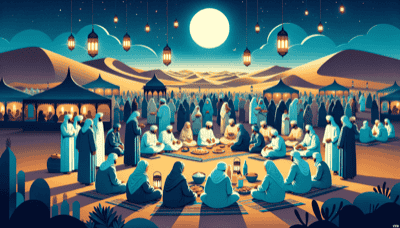We're here to help you keep count of the days to or since a date. Just click the button below and enter your chosen date to get started. Also choose the suggested days or search for a special day above #countingthedays

Eid al-Fitr, also known as the "Festival of Breaking the Fast," is a significant Islamic holiday celebrated by Muslims worldwide, marking the end of Ramadan, the holy month of fasting. In Algeria, a predominantly Muslim country, this day is a national holiday and is observed with great religious fervor and cultural richness.
Eid al-Fitr has its roots in Islamic tradition, established by the Prophet Muhammad after his migration from Mecca to Medina. The celebration is based on the Islamic lunar calendar and begins with the sighting of the new moon at the end of Ramadan.
In Algeria, Eid al-Fitr starts with an early morning prayer called Salat al-Eid. This special prayer is performed in large congregations in mosques or open spaces known as musallas. Before heading to the prayer, it is customary for individuals to perform ghusl (ritual cleansing), wear new or clean clothes, and eat something sweet, usually dates.
After prayers, Algerians engage in social practices such as visiting relatives and neighbors. It's common for people to exchange greetings like "Eid Mubarak" (Blessed Eid) or "Aïd Saïd" (Happy Eid) while sharing meals and sweets with each other. Children often receive small gifts or money from elders in a tradition called "Eidi."
Food plays a central role during Eid celebrations. In Algeria, families prepare special dishes such as couscous, chakhchoukha (stew with flatbread), rechta (noodles), tajines, and various pastries including baklava and makroud—a date-filled cookie that's particularly popular during festivities.
Charity is also an essential aspect of Eid al-Fitr in Algeria. Zakat al-Fitr (charitable giving) is given to those in need before Salat al-Eid so that everyone can enjoy the day's celebrations.
The holiday period may also include various forms of entertainment like fairs, public performances, games for children, and outings with family members as people make the most of their time off work to celebrate together.
Overall, Eid al-Fitr in Algeria is characterized by communal prayers, family gatherings, feasting on traditional foods, exchanging gifts among loved ones, charitable acts towards those less fortunate, and joyful celebrations reflecting gratitude after a month of